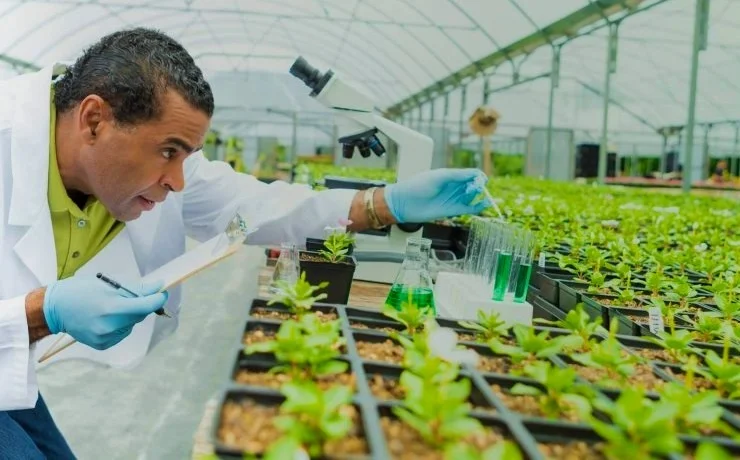The United States is the country with the earliest development of agricultural biotechnology in the world. Various types of biotechnology and related products have been widely used in all aspects of agricultural production and food security.
 |
| Biotechnology in agriculture |
How Has Biotechnology Impacted Agriculture in the US?
The rapid development of biotechnology has brought opportunities for agricultural technological revolution and agricultural development. The United States is the country with the earliest development of agricultural biotechnology in the world.
The application of agricultural biotechnology has entered the stage of industrialization. Various types of biotechnology and related products have been widely used in all aspects of agricultural production, playing an important role, and contributing to the industrialization of agriculture. Modernization has injected great vitality.
Biotechnology has been instrumental in increasing crop yields to improve food, feed, and fiber security, and in reducing the ecological footprint of agriculture.
The United States is promoting the application of the four major biotechnology projects (namely genetic engineering, cell engineering, enzyme engineering, and fermentation engineering) in the agricultural field, it has also stepped into the era of agricultural biotechnology from traditional agriculture methods. Among them, new plant breeding techniques have become the highlight of this era.
Breeding technology refers to the use of genetically modified methods to transfer genes that control excellent traits from different plants and even animals to the desired plants or animals, so as to realize the desire to improve crops or animals according to people's will.
The cultivation of genetically modified crops is a comprehensive innovation compared with the sexual hybridization and asexual reproduction technology of traditional crops. It has the advantages of shortening the breeding period, overcoming the insurmountable obstacles of conventional breeding, and promoting the combination of genetic material between species. The application greatly improves the yield of crops and agricultural efficiency.
In essence, the main purpose of plant genetic engineering is the same as conventional breeding, that is, to create new crop varieties with excellent traits. Since the 1970s, the United States has bred a number of crop varieties with high-yield, insect-resistant, disease-resistant, drought- and flood-resistant characteristics by using genetic breeding technology.
Commercial Aspects of Biotechnology in Agriculture
Biotechnology is beneficial in agriculture, food production, and medicine that are commercial in nature. Biotechnology provides strategic tools for the agricultural industry to meet the demands of the global market.
Biotechnology crops are the most important field of the agricultural biotechnology industry in the United States. Moreover, the United States is currently the country with the largest planting area of biotech crops in the world.
Since the commercial planting of the first genetically modified crops began in 1996, the planting area of biotech crops in the United States has expanded from 1.5 million hectares to 44.7 million hectares in 2004. It is the largest producing area and market for biotech crops.
Currently, corn, cotton, soybean, canola, tomato, melon, rice, flax, sugar beet, pumpkin, papaya and chicory and other crops in the United States already have biotech crop varieties that can be grown commercially. Among them, the biotech crops that have been commercialized on a large scale are mainly corn, cotton and soybeans.
Among the commercially available biotech crops, the yield per acre of corn has the largest value-added value compared with the yield of traditional varietie.
Agricultural Biotechnology and Public Policy
The reason why the application of agricultural biotechnology in the United States has made such a great achievement is mainly due to the application of public policies in the agricultural biotechnology industry.
As the most advanced country in agricultural biotechnology in the world, the U.S. government’s guiding ideology for the development of the agricultural biotechnology industry is to strengthen its own leading advantages on the one hand and lead the development direction of the world’s agricultural biotechnology industry; The promoting role of science and technology has comprehensively promoted sustainable economic and social development.
The new technology of agricultural biology is dizzying, but how to make farmers quickly accept it is the real key. To this end, governments at all levels in the United States have strengthened the promotion of agricultural biotechnology and efficient services in all aspects, and have actively formed non-governmental agricultural social services with various professional associations and decision-making consulting agencies to guide farmers to use biotechnology.
The United States relies on market mechanisms and competition policies to make the agricultural biotechnology industry with high input and high output characteristics attract many investors, which makes the competition in this industry very fierce.
The U.S. government uses economic policies and other levers to guide capital investment in agricultural biotechnology and industry. Through a series of preferential measures such as tax incentives, government guarantees, R&D subsidies, and information services, the government encourages venture capital investment in the agricultural biotechnology industry, thereby promoting the rapid development of the agricultural biotechnology industry
Read Also:
